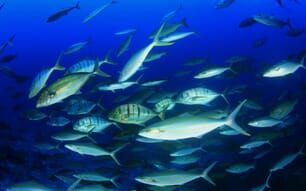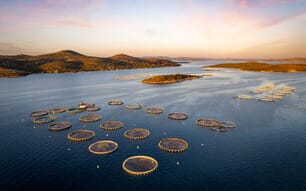The Greenpeace ship Esperanza has been documenting fishing activities in the Indian Ocean since March, observing fishing and transfers of fish at sea and exposing suspected illegal fishing by Sri Lankan boats in the protected Chagos waters. This follows an expedition to the Indian Ocean with the Greenpeace flagship Rainbow Warrior last year.
Greenpeace International is presenting the findings from its ship expeditions to the Committee on Compliance of the Indian Ocean Tuna Commission currently meeting in Mauritius ahead of a full IOTC meeting next week.
"The IOTC is failing to control fishing fleets and to prevent and combat illegal fishing. The most effective measure that the IOTC members meeting in Mauritius can adopt is to ban all transshipments of fish at sea," said Sari Tolvanen, Greenpeace International oceans campaigner in Mauritius.
"Only by making the vessels come to port can authorities adequately inspect vessels and the fish they catch. This would also bring additional income for coastal states running port facilities."
On 24 March, the activists aboard the Esperanza found eight Sri Lankan fishing vessels inside the protected Chagos waters. These vessels are suspected of fishing illegally and Greenpeace International has reported the incidents to the relevant governments and the IOTC.
These findings come in addition to the results of Greenpeace's 2012 expedition in the region, published in February 2013, and where several cases of illegal fishing were documented, including five cases involving Sri Lankan vessels.
"Sri Lanka needs to clampdown on the illegal activities of its sprawling fleet and to stop the entry of illegally caught fish into the country or its seafood industry risks losing its access to lucrative foreign markets," Ms Tolvanen added.
On 25 and 28 April, the activists also observed transfers of fish in international waters just outside the Mauritius Exclusive Economic Zone (EEZ) from small long line vessels. One of the fishing vessels did not have any fishing gear raising suspicion it acts as an unregulated fish transfer vessel between the fleets. This operation could be used to hide the illegal origin of the fish.
Transfers of fish at sea are considered one of the main laundering mechanisms for illegally caught fish and unreported catches. The region's tuna stocks hang in the balance as fishing efforts intensify and extra capacity is needed for monitoring and control. The albacore fishery is especially suffering.
Greenpeace is campaigning for a more sustainable fishing industry and a global network of fully protected marine reserves at sea, both necessary steps to creating healthy, living oceans for future generations.



